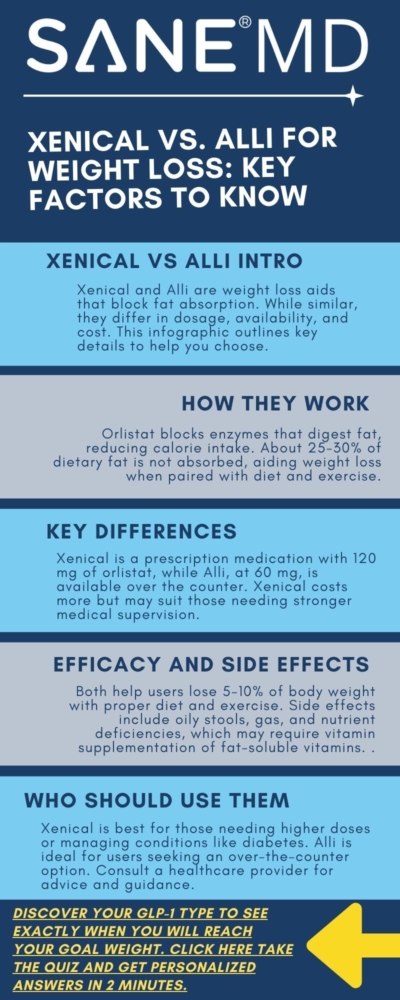Xenical vs. Alli for Weight Loss: Key Factors to Know
Dr. Matthew Olesiak, MD, is the Chief Medical Director at SANESolution, a renowned wellness technology company dedicated to providing evidence-based solutions for optimal living. Dr. Olesiak earned his medical degree from the prestigious Jagiellonian University Medical College in Kraków, Poland, where he developed a strong foundation in medicine.
When it comes to weight loss aids, choosing the right medication can make a significant difference in achieving your goals. Xenical and Alli, two forms of orlistat, offer similar mechanisms of action but differ in their dosage, availability, and recommended use. Both medications target fat absorption in the digestive system, helping compatible overweight adults lose weight when combined with a reduced-calorie diet and regular physical activity. Should you choose Orlistat in the form of Xenical or Alli?
This article explores the key differences between Xenical vs Alli for weight loss, their effectiveness, side effects, and suitability for different users.
Key Takeaways
- Xenical and Alli contain the same active ingredient, orlistat, but differ in dosage and availability: Xenical is a prescription medication, while Alli is available over the counter.
- Both medications block dietary fat absorption and are effective when paired with a low-fat diet and exercise plan, but they come with side effects like digestive discomfort.
- Choosing between Xenical and Alli depends on individual needs, lifestyle factors, and consultation with a healthcare provider.
Understanding Xenical and Alli
How Do They Work?
Orlistat, the active ingredient in both Xenical and Alli, blocks the action of lipase, an enzyme that breaks down dietary fat into smaller components for absorption. By inhibiting this process, orlistat prevents about 25-30% of fat from being absorbed, causing it to pass through the digestive system instead.
This mechanism helps reduce calorie intake and promotes weight loss when combined with a low-calorie, low-fat diet and regular exercise. For overweight adults struggling with lifestyle-related issues like high blood pressure or high cholesterol, these medications can provide additional support.
Key Differences Between Xenical and Alli
Though both Xenical and Alli use orlistat as their active ingredient, there are important distinctions:
- Dosage: Xenical contains 120 mg of orlistat per capsule, while Alli provides a lower dose of 60 mg.
- Availability: Xenical is a prescription orlistat product requiring approval from a healthcare provider, whereas Alli is an over-the-counter medication.
- Use Case: Xenical may be recommended for patients needing higher doses and closer medical supervision, while Alli is designed for general consumer use.
- Cost: The price of Xenical is typically higher than Alli due to its prescription-only status.
Grasping these distinctions enables individuals to make an informed decision tailored to their weight loss objectives and overall health.
Comparison of Xenical and Alli for Weight Loss
| Feature | Xenical | Alli |
|---|---|---|
| Active Ingredient | Orlistat | Orlistat |
| Dosage | 120 mg per capsule | 60 mg per capsule |
| Availability | Prescription-only | Over-the-counter |
| Intended Use | For individuals needing higher doses and medical supervision | For general consumer use |
| Cost | Typically higher due to prescription | Generally lower, OTC option |
| Mechanism | Blocks absorption of 25-30% dietary fat | Blocks absorption of 25-30% dietary fat |
| Common Side Effects | Oily stools, gas, frequent bowel movements | Oily stools, gas, frequent bowel movements |
| Dietary Requirement | Low-fat, reduced-calorie diet | Low-fat, reduced-calorie diet |
| Best For | Patients with a higher BMI or medical conditions | Individuals seeking OTC weight loss support |
| Supplement Needs | Fat-soluble vitamins (A, D, E, K) | Fat-soluble vitamins (A, D, E, K) |
Effectiveness of Xenical and Alli
Both medications work the same way to help users lose weight, but their effectiveness can vary based on adherence to lifestyle changes.
- Dietary Adherence: A low-fat diet is crucial for minimizing side effects like loose stools, frequent bowel movements, and abdominal pain. High-fat meals can exacerbate these issues, particularly when taking Alli or Xenical.
- Weight Loss Outcomes: According to studies published in the National Library of Medicine, users of Orlistat can expect to lose about 5-10% of their body weight in the first few months, provided they follow a reduced-calorie diet and exercise plan.
- Long-Term Commitment: Sustaining weight loss requires regular physical activity and adherence to a healthy lifestyle to prevent gaining weight back after stopping treatment.
Common Side Effects
Both Xenical and Alli are associated with side effects related to their impact on fat absorption. These include:
- Digestive Discomfort: Symptoms such as oily stools, gas with discharge, and more frequent bowel movements are common, especially after a high-fat meal.
- Nutrient Deficiencies: Orlistat blocks the absorption of fat-soluble vitamins (A, D, E, and K), potentially leading to deficiencies if supplements are not taken.
- Liver Injury: Rare but serious cases of liver injury have been reported, emphasizing the importance of monitoring symptoms and consulting a healthcare provider.
- Other Effects Related to the Digestive System: Abdominal pain, cramping, and discomfort may occur, particularly during the initial stages of treatment.
Managing these side effects often involves adjusting dietary fat intake and taking a multivitamin containing beta carotene to ensure proper nutrition.
Who Should Consider Xenical or Alli?
Choosing between Xenical and Alli depends on individual health needs, lifestyle, and preferences:
- Xenical: Best suited for patients with a higher body mass index (BMI) or those needing supervised medical care to manage conditions like diabetes or heart disease.
- Alli: A convenient option for those seeking an over-the-counter weight loss aid as part of a reduced calorie low-fat diet and exercise regimen.
- General Suitability: Both medications work effectively for overweight adults who are committed to making long-term changes to their diet and physical activity.
Consulting a healthcare provider can help determine the best option based on factors like medical history and potential benefits.
Tips for Successful Weight Loss with Xenical or Alli
To maximize the benefits of these medications, consider the following strategies:
1. Follow a Reduced Calorie Diet:
To minimize side effects and enhance weight loss, focus on consuming nutrient-dense, low-fat foods. Choose lean proteins like chicken or fish, legumes, fresh fruits, and vegetables. Limit high-fat and processed foods, and aim to keep your total fat intake below 30% of your daily calories.
Use tools like food diaries or apps to track your intake and maintain consistency.
2. Engage in Regular Exercise
Physical activity is a key component of any weight loss plan. Combine aerobic exercises such as walking, jogging, or cycling with strength training to build muscle and increase metabolism.
Begin with moderate-intensity workouts for at least 150 minutes each week, and gradually increase the intensity and duration as your fitness level improves.
Tailor your exercise plan to your preferences to maintain motivation.
3. Take Supplements
Since orlistat can interfere with the absorption of fat-soluble vitamins, incorporate a daily multivitamin containing vitamins A, D, E, K, and beta carotene. Take the supplement at least two hours before or after taking Xenical or Alli to ensure proper nutrient absorption.
Consult a healthcare provider to determine the best supplement for your needs.
4. Monitor Side Effects
Be aware of potential digestive side effects such as oily stools, frequent bowel movements, or abdominal discomfort. Adjust your diet by reducing fat intake or spacing meals more evenly throughout the day to mitigate these effects.
If side effects persist or worsen, consult your healthcare provider for guidance.
5. Stay Consistent
Consistency is critical for long-term success. Take Xenical or Alli as directed, typically with meals containing fat, and pair the medication with ongoing lifestyle changes. Set realistic weight loss goals and celebrate non-scale victories such as improved energy levels, better fitness, or lower blood pressure.
Consistent check-ins with your healthcare provider are essential for monitoring progress and making necessary adjustments to your plan.
Potential Risks and Considerations
While both Xenical and Alli are approved by the Food and Drug Administration (FDA) and considered safe for most users, there are some risks to consider:
- Allergic Reactions: Rare but possible reactions to the active ingredient, orlistat.
- Interactions with Other Medications: Those taking Orlistat should discuss potential interactions with their healthcare provider, especially if using drugs for diabetes or high blood pressure.
- Kidney Stones: Rare cases of kidney stones have been reported in users of Orlistat. Staying hydrated and following dietary recommendations can help reduce this risk.
Frequently Asked Questions
Weight loss medications like Xenical and Alli often raise questions about their effectiveness, differences, and results.
Here are answers to some of the most commonly asked questions.
Does Xenical work better than Alli?
Xenical and Alli contain the same active ingredient, orlistat, and work in the same way by blocking fat absorption. However, Xenical’s higher dosage (120 mg compared to Alli’s 60 mg) may make it more effective for certain individuals, particularly those requiring a stronger dose to meet their weight loss goals.
Consulting a healthcare provider can help determine which option is better suited to your needs.
Does Xenical reduce belly fat?
Xenical does not specifically target belly fat but promotes overall weight loss by reducing the fat absorbed from your diet. With consistent use, along with a reduced calorie diet and regular exercise, Xenical can help reduce total body fat, which may include fat stored in the abdominal area.
Results will vary depending on individual body composition and adherence to lifestyle changes.
How much weight can you lose on Alli in a week?
Weight loss with Alli varies, but most users can expect to lose about 1-2 pounds per week when combining the medication with a low-fat, reduced-calorie diet and exercise. This steady rate of weight loss aligns with recommendations for sustainable and healthy progress.
Individual results may differ based on adherence to dietary and lifestyle modifications.
Is Xenical as good as Ozempic?
Xenical and Ozempic serve different purposes and are not directly comparable. While Xenical focuses on blocking dietary fat absorption, Ozempic, a GLP-1 receptor agonist, regulates blood sugar and suppresses appetite.
Ozempic may be more effective for significant weight loss, particularly for individuals with type 2 diabetes, but Xenical remains a reliable option for those focused on reducing fat intake.
Discussing these medications with a healthcare provider can help determine which is better suited to your weight loss plan.
Is Xenical more effective than Alli?
Xenical’s higher dosage makes it potentially more effective for certain individuals, particularly those who need stronger medical intervention.
However, both medications work through the same mechanism and are effective when combined with a calorie low-fat diet and exercise.
The choice between Xenical and Alli often comes down to convenience, cost, and individual weight loss needs.
Conclusion
Choosing between Xenical vs. Alli for weight loss ultimately depends on individual needs and preferences. Both medications offer effective tools for losing weight when combined with a low-fat diet, regular exercise, and long-term lifestyle changes.
While Xenical may be better suited for those requiring higher doses and medical supervision, Alli provides a convenient, over-the-counter option for individuals seeking a weight loss aid.
Before starting any weight loss medication, consult a healthcare provider to discuss potential benefits, risks, and the best treatment plan for achieving and maintaining a healthy body weight.





